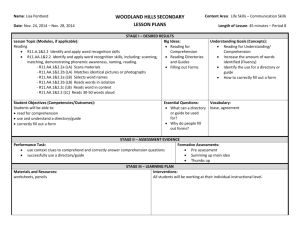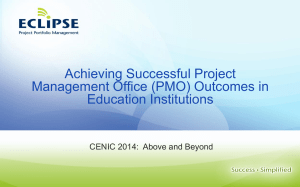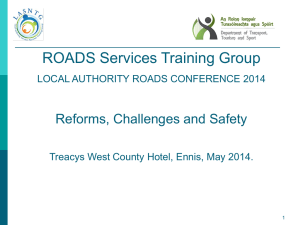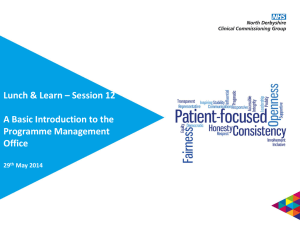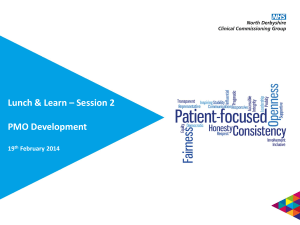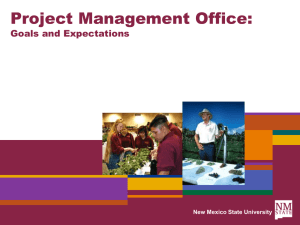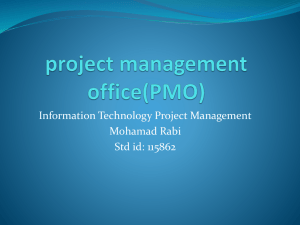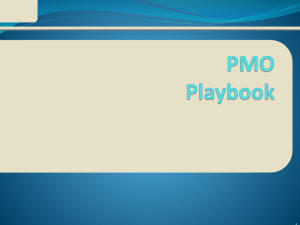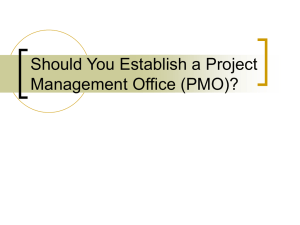12th February 2014 - North Derbyshire CCG
advertisement
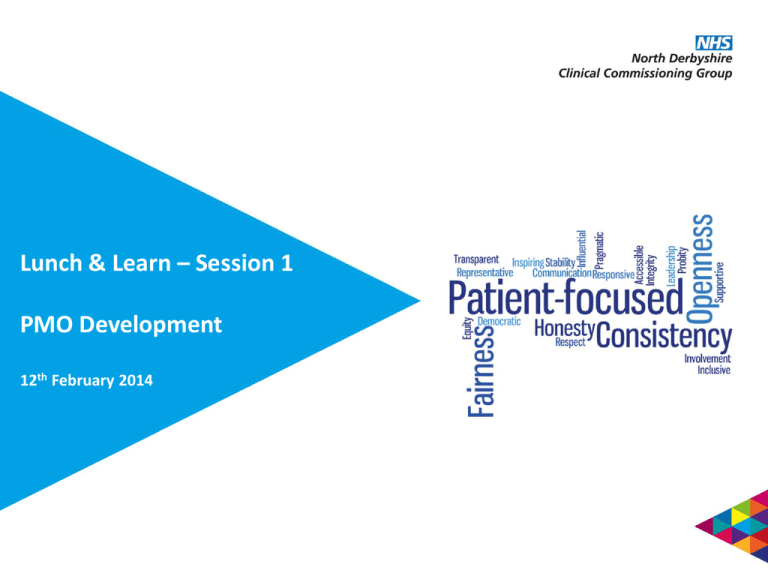
Lunch & Learn – Session 1 PMO Development 12th February 2014 Lunch & Learn – Session 1 Aim: To develop the PMO processes with you. By 1.30PM • overview of PMO (brief!) • Inform the design of the Project Proposal Document • Inform the design of the Project Planning Document Why do we need a PMO? • Operational: To ensure the CCG delivers its plan and fundamentally improves services for patients. • Strategic/Transformational: – in order to survive the CCG will need to transform health services in North Derbyshire. This will only be delivered if we have a clear roadmap of how to get there and ensure we deliver against this. – The CCG will also need to ensure sustainability of its providers or if sustainability is not desirable drive the commissioning of alternative models. Why do we need a PMO? • Financial: – Comprehensive Spending Review – funding increases will not cover demand and inflation in future years and the CCG will need to make some difficult decisions about where to invest (and disinvest). – QIPP is not delivering year to date – will be critical in future years to deliver financial balance and maintain authorisation. 390,000 385,000 Year 2 Gap: £14.1m 380,000 375,000 Forecast Spend 370,000 Resources Available 365,000 Year 1 Gap: £9m 360,000 355,000 2013/14 2014/15 2015/16 What is a PMO? The PMO provides Detailed Plans Risk Management Benefit Tracking Challenging Progress Programme Management Office Programme support • Programme/project development; • sufficiently robust to provide best chance of success during implementation; • rigorously detailed to allow measurement and to track progress; • ensure appropriate tools, templates and processes are used and followed; • implemented within the planned time limit and with the intended outcomes (i.e. milestones and KPI’s are met); • provide project managers with support, advice and signposting to additional expertise for their projects Monitoring and Measurement function Co-ordination, Review and Scrutiny of key projects What isn’t a PMO? Detailed Plans A PMO is NOT a function that takes control over the projects from Programme Leads Risk Management Benefit Tracking Challenging Progress Programme Management Office It oversees and monitors delivery, it doesn’t do or deliver the projects themselves! What are the benefits of our PMO? The PMO will help you to: • • • • • • Demonstrate that we are delivering tangible improvements in service/patient care and shout about our successes! Provide assurance to the Governing Body that implementation of our plans is progressing and delivering the intended benefits. Identify what work/projects are priority and focus resource accordingly Enable any barriers to progress/issues to be resolved quickly Facilitate more effective and quicker decision making. Develop excellent project management capabilities that will ensure we are an effective and slick organisation. DRAFT PMO Governance Structure Governing Body Gov. Body Assurance Committee Plan Delivery Group Purpose: Oversees/monitors and ensures delivery of the CCG Plan Clinically led Programme Groups, i.e.: • • • • • • • Urgent Care Working Group Integrated Care project group Primary care Children, maternity and young people Long Term Conditions/Planned Care groups Mental Health and LD Medicines Management PMO SUPPORT: Provides assurance in the form of a monthly highlight report including exceptional progress and exceptions they can assist to progress • Identifies key decisions to be made • Highlights issues that the Group can assist in resolving • Coordinates the agenda and produces highlight report (by exception). • Assist in expediting/unblocking barriers to progress • Project resource is deployed where required to bring projects back on track • Works with programme leads to ensure all project documentation is in place • Status reports are provided monthly PMO Structure Notes: • Clinically led programmes will continue to report via their existing governance processes. Links into PMO therefore shown as a dotted line here. • Multi-stakeholder/disciplinary groups will be supported by an Executive Sponsor, Clinical and Programme Manager. They provide the top-level vision and support to the Programme Manager to drive the change by: • advocating the case for change to strategic stakeholders, • enabling delivery of the programme plan, • assisting resolution of major issues, • encouraging progress, and • ultimately ensuring delivery of benefits. Lunch & Learn – Session 1 PMO – was it good for you? Authorization of Projects - 1 Process for Development & Implementation of Change Projects NO ACTION RESPONSIBILITIES TIMELINE Identify Need Locality / Programme Week 1 Generate & prioritize ideas Locality / Programme Week 2 Draft project Proposal and identify priority level Locality / Programme / PMO Week 2 Submit To Authorising Group* Locality / Programme / PMO Week 2 Prioiritization Reviewed and Agreed Authorising Group* Week 3 Decision to proceed Authorising Group* Week 3 YES Project Proposal • Purpose: justify the release of resources to work up this proposal into a project 10 mins discussion, 5 mins feedback • Terminology • Ease of use • Sufficient • Gaps? Authorization of Projects - 2 Process for Development & Implementation of Change Projects - page 2 NO ACTION RESPONSIBILITIES TIMELINE Refine project Proposal into Project Planning Document Locality / Programme / PMO Week 4-7 Submit to Authorising Group* Locality / Programme / PMO Week 8 Decision to Proceed Authorising Group* Week 8 YES Implementation Locality / Programme / PMO project performance and outcome monitoring PMO Project Planning Document • Purpose: set out how and when the project’s aims and objectives are to be achieved. It will define the approach to be used by the Project team and provides details of the execution, management and control of the project to include costs, milestones, activities and resources Project Planning Document • 10 mins discussion, 5 mins feedback • What’s good? • What’s not? Lunch & Learn – Session 1 Next Steps: Answer the 9 questions by Feb 28th Produce a Project Planning Document by March 31st Lunch & Learn – Session 1 Next Lunch & Learns Wednesday 19th February Fit for Purpose: Your opportunity to contribute to the PMO Process through engagement & ideas about future plans. Tuesday 4th March Back to Basics: For staff looking to refresh your project management skills Wednesday 12th March Crunchy Numbers: Measuring the success of your project is critical in ‘knowing how you are doing’. This session will help you in developing outcomes and how to measure impact Wednesday 19th March The Future Understanding the PMO reporting cycle Last Chance Saloon: Open space for questions, specific project support and development Wednesday 26th March Lunch & Learn – Session 1 Thank you Please Evaluate now
